Advance Accounting Theory Analyses 2022
VerifiedAdded on 2022/09/15
|10
|2506
|22
AI Summary
Contribute Materials
Your contribution can guide someone’s learning journey. Share your
documents today.
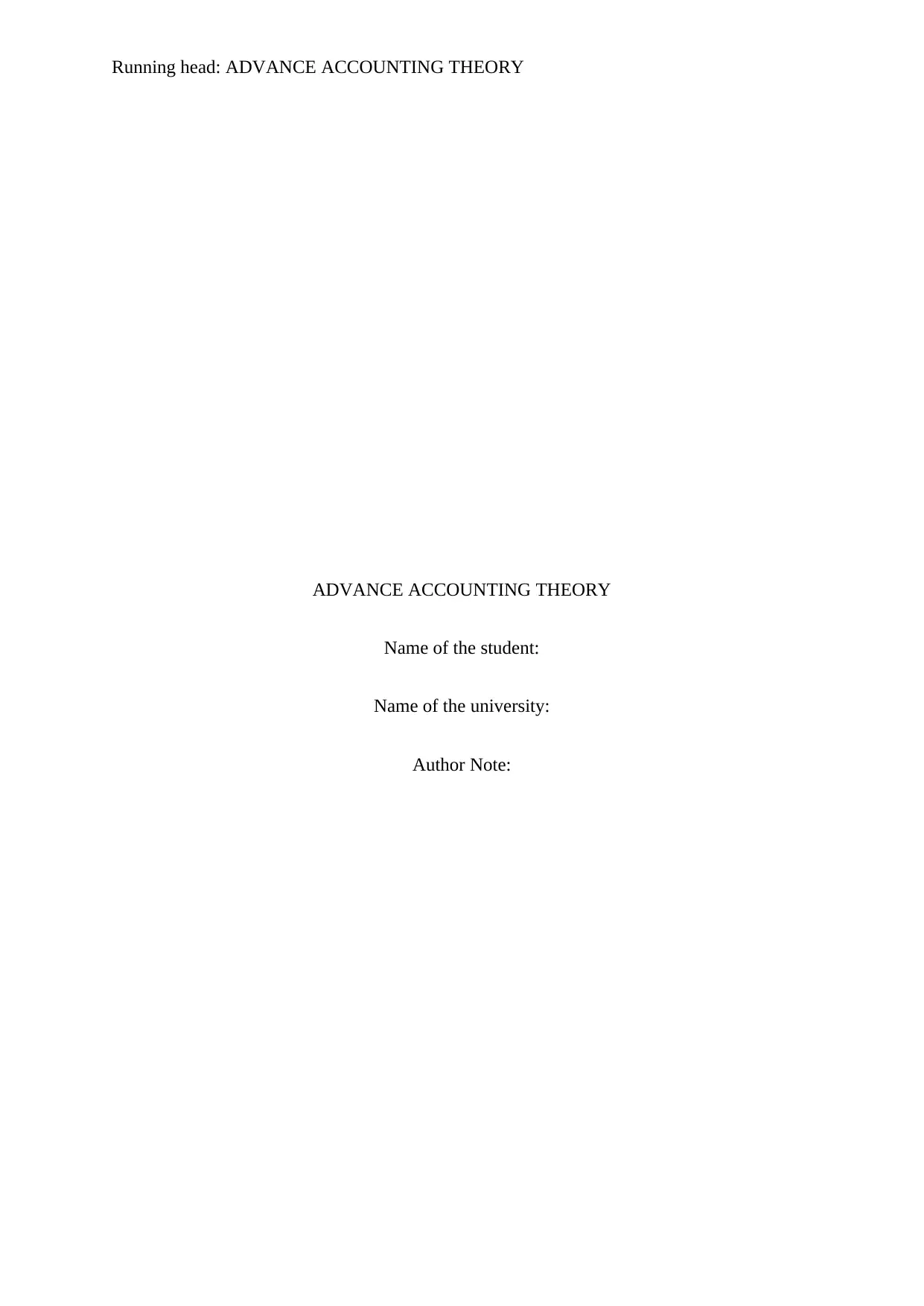
Running head: ADVANCE ACCOUNTING THEORY
ADVANCE ACCOUNTING THEORY
Name of the student:
Name of the university:
Author Note:
ADVANCE ACCOUNTING THEORY
Name of the student:
Name of the university:
Author Note:
Secure Best Marks with AI Grader
Need help grading? Try our AI Grader for instant feedback on your assignments.
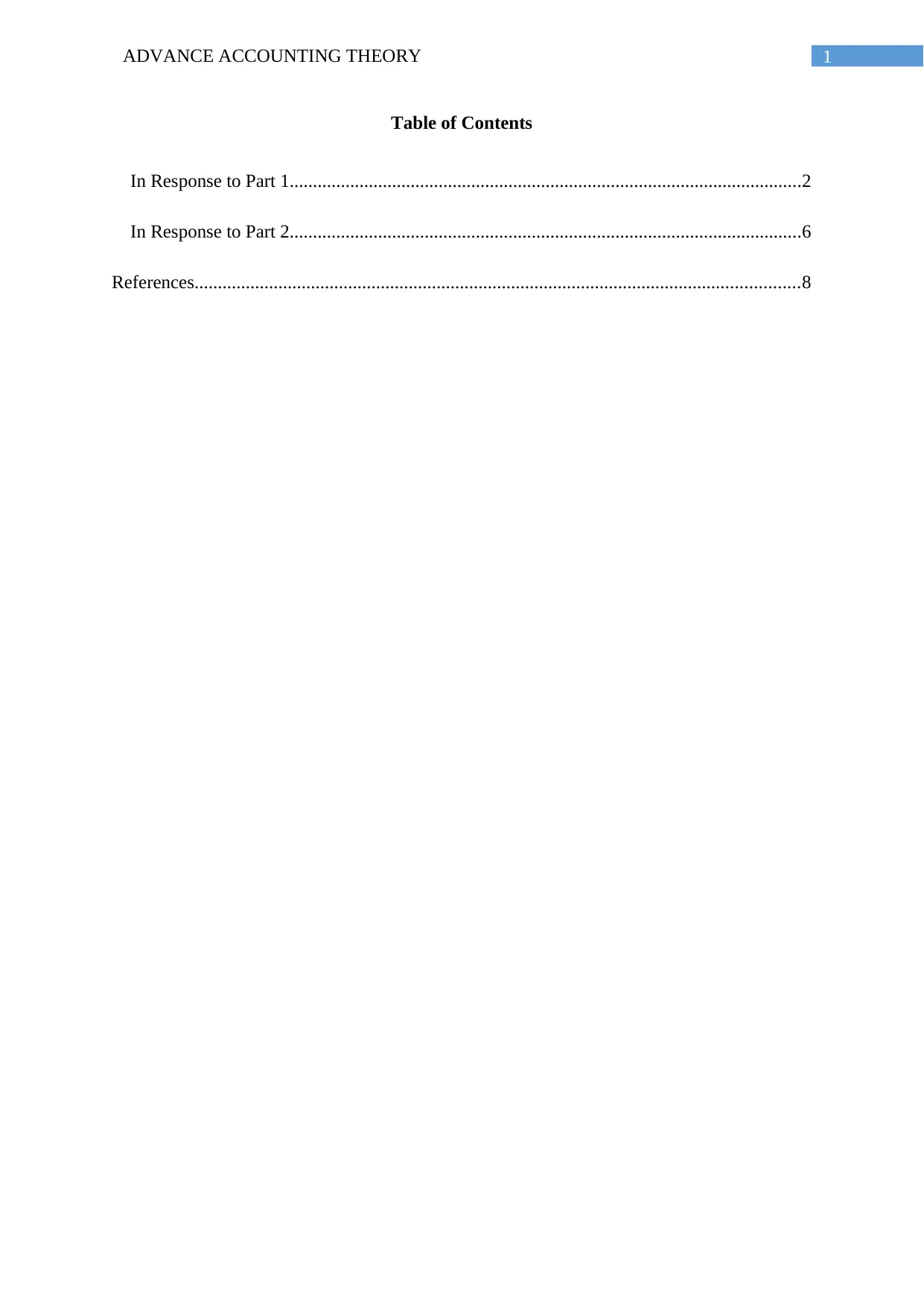
1ADVANCE ACCOUNTING THEORY
Table of Contents
In Response to Part 1..............................................................................................................2
In Response to Part 2..............................................................................................................6
References..................................................................................................................................8
Table of Contents
In Response to Part 1..............................................................................................................2
In Response to Part 2..............................................................................................................6
References..................................................................................................................................8
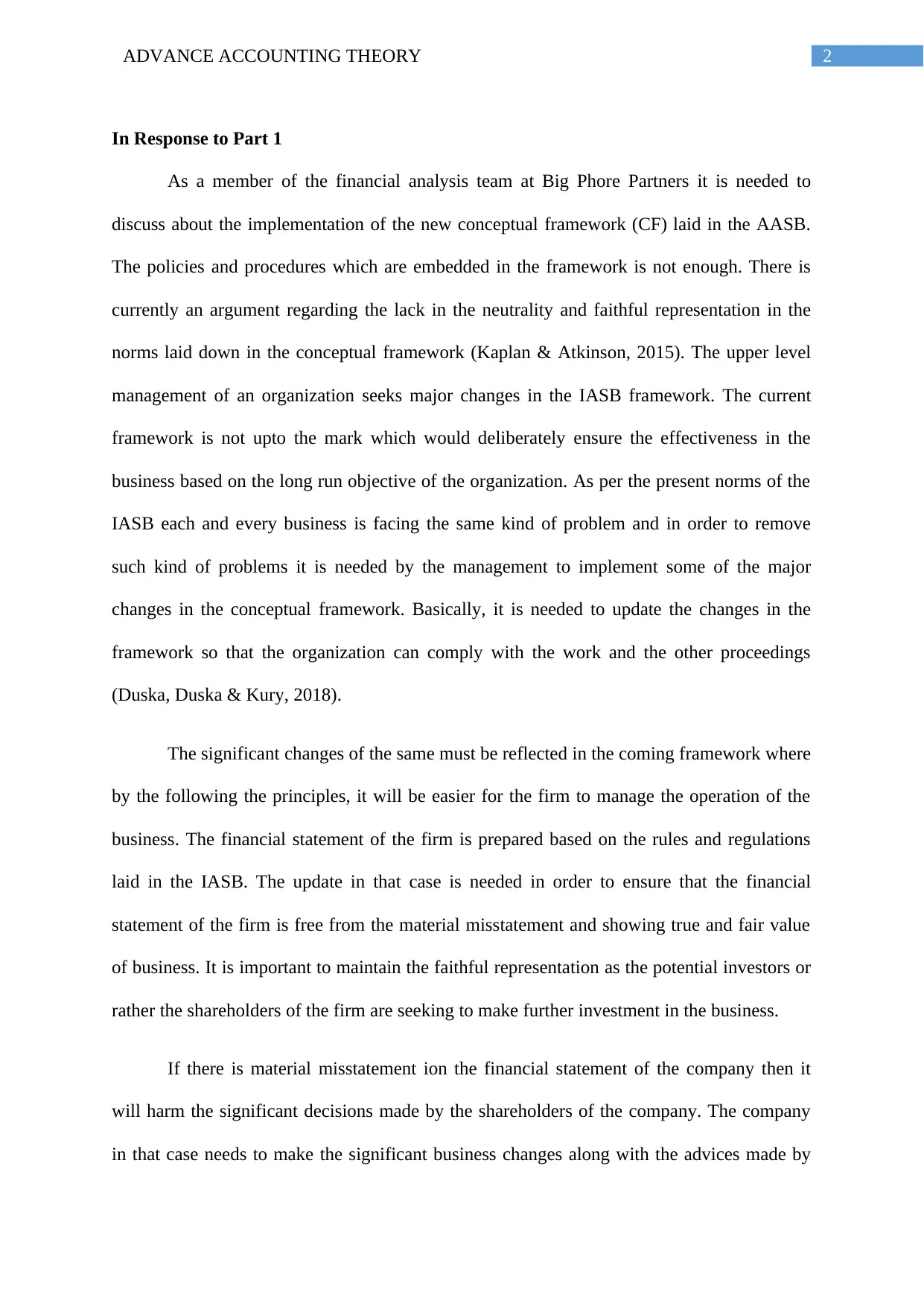
2ADVANCE ACCOUNTING THEORY
In Response to Part 1
As a member of the financial analysis team at Big Phore Partners it is needed to
discuss about the implementation of the new conceptual framework (CF) laid in the AASB.
The policies and procedures which are embedded in the framework is not enough. There is
currently an argument regarding the lack in the neutrality and faithful representation in the
norms laid down in the conceptual framework (Kaplan & Atkinson, 2015). The upper level
management of an organization seeks major changes in the IASB framework. The current
framework is not upto the mark which would deliberately ensure the effectiveness in the
business based on the long run objective of the organization. As per the present norms of the
IASB each and every business is facing the same kind of problem and in order to remove
such kind of problems it is needed by the management to implement some of the major
changes in the conceptual framework. Basically, it is needed to update the changes in the
framework so that the organization can comply with the work and the other proceedings
(Duska, Duska & Kury, 2018).
The significant changes of the same must be reflected in the coming framework where
by the following the principles, it will be easier for the firm to manage the operation of the
business. The financial statement of the firm is prepared based on the rules and regulations
laid in the IASB. The update in that case is needed in order to ensure that the financial
statement of the firm is free from the material misstatement and showing true and fair value
of business. It is important to maintain the faithful representation as the potential investors or
rather the shareholders of the firm are seeking to make further investment in the business.
If there is material misstatement ion the financial statement of the company then it
will harm the significant decisions made by the shareholders of the company. The company
in that case needs to make the significant business changes along with the advices made by
In Response to Part 1
As a member of the financial analysis team at Big Phore Partners it is needed to
discuss about the implementation of the new conceptual framework (CF) laid in the AASB.
The policies and procedures which are embedded in the framework is not enough. There is
currently an argument regarding the lack in the neutrality and faithful representation in the
norms laid down in the conceptual framework (Kaplan & Atkinson, 2015). The upper level
management of an organization seeks major changes in the IASB framework. The current
framework is not upto the mark which would deliberately ensure the effectiveness in the
business based on the long run objective of the organization. As per the present norms of the
IASB each and every business is facing the same kind of problem and in order to remove
such kind of problems it is needed by the management to implement some of the major
changes in the conceptual framework. Basically, it is needed to update the changes in the
framework so that the organization can comply with the work and the other proceedings
(Duska, Duska & Kury, 2018).
The significant changes of the same must be reflected in the coming framework where
by the following the principles, it will be easier for the firm to manage the operation of the
business. The financial statement of the firm is prepared based on the rules and regulations
laid in the IASB. The update in that case is needed in order to ensure that the financial
statement of the firm is free from the material misstatement and showing true and fair value
of business. It is important to maintain the faithful representation as the potential investors or
rather the shareholders of the firm are seeking to make further investment in the business.
If there is material misstatement ion the financial statement of the company then it
will harm the significant decisions made by the shareholders of the company. The company
in that case needs to make the significant business changes along with the advices made by
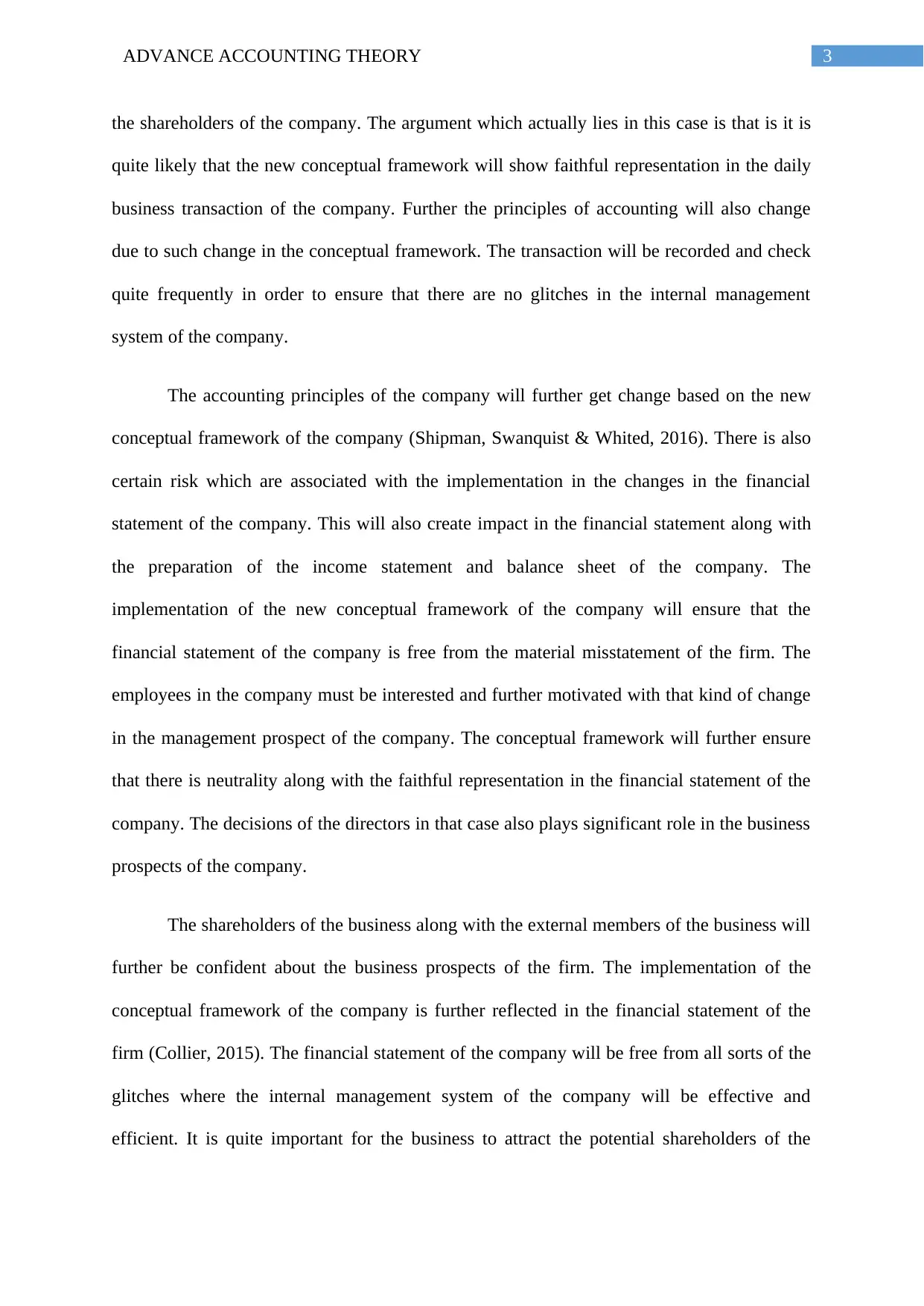
3ADVANCE ACCOUNTING THEORY
the shareholders of the company. The argument which actually lies in this case is that is it is
quite likely that the new conceptual framework will show faithful representation in the daily
business transaction of the company. Further the principles of accounting will also change
due to such change in the conceptual framework. The transaction will be recorded and check
quite frequently in order to ensure that there are no glitches in the internal management
system of the company.
The accounting principles of the company will further get change based on the new
conceptual framework of the company (Shipman, Swanquist & Whited, 2016). There is also
certain risk which are associated with the implementation in the changes in the financial
statement of the company. This will also create impact in the financial statement along with
the preparation of the income statement and balance sheet of the company. The
implementation of the new conceptual framework of the company will ensure that the
financial statement of the company is free from the material misstatement of the firm. The
employees in the company must be interested and further motivated with that kind of change
in the management prospect of the company. The conceptual framework will further ensure
that there is neutrality along with the faithful representation in the financial statement of the
company. The decisions of the directors in that case also plays significant role in the business
prospects of the company.
The shareholders of the business along with the external members of the business will
further be confident about the business prospects of the firm. The implementation of the
conceptual framework of the company is further reflected in the financial statement of the
firm (Collier, 2015). The financial statement of the company will be free from all sorts of the
glitches where the internal management system of the company will be effective and
efficient. It is quite important for the business to attract the potential shareholders of the
the shareholders of the company. The argument which actually lies in this case is that is it is
quite likely that the new conceptual framework will show faithful representation in the daily
business transaction of the company. Further the principles of accounting will also change
due to such change in the conceptual framework. The transaction will be recorded and check
quite frequently in order to ensure that there are no glitches in the internal management
system of the company.
The accounting principles of the company will further get change based on the new
conceptual framework of the company (Shipman, Swanquist & Whited, 2016). There is also
certain risk which are associated with the implementation in the changes in the financial
statement of the company. This will also create impact in the financial statement along with
the preparation of the income statement and balance sheet of the company. The
implementation of the new conceptual framework of the company will ensure that the
financial statement of the company is free from the material misstatement of the firm. The
employees in the company must be interested and further motivated with that kind of change
in the management prospect of the company. The conceptual framework will further ensure
that there is neutrality along with the faithful representation in the financial statement of the
company. The decisions of the directors in that case also plays significant role in the business
prospects of the company.
The shareholders of the business along with the external members of the business will
further be confident about the business prospects of the firm. The implementation of the
conceptual framework of the company is further reflected in the financial statement of the
firm (Collier, 2015). The financial statement of the company will be free from all sorts of the
glitches where the internal management system of the company will be effective and
efficient. It is quite important for the business to attract the potential shareholders of the
Secure Best Marks with AI Grader
Need help grading? Try our AI Grader for instant feedback on your assignments.
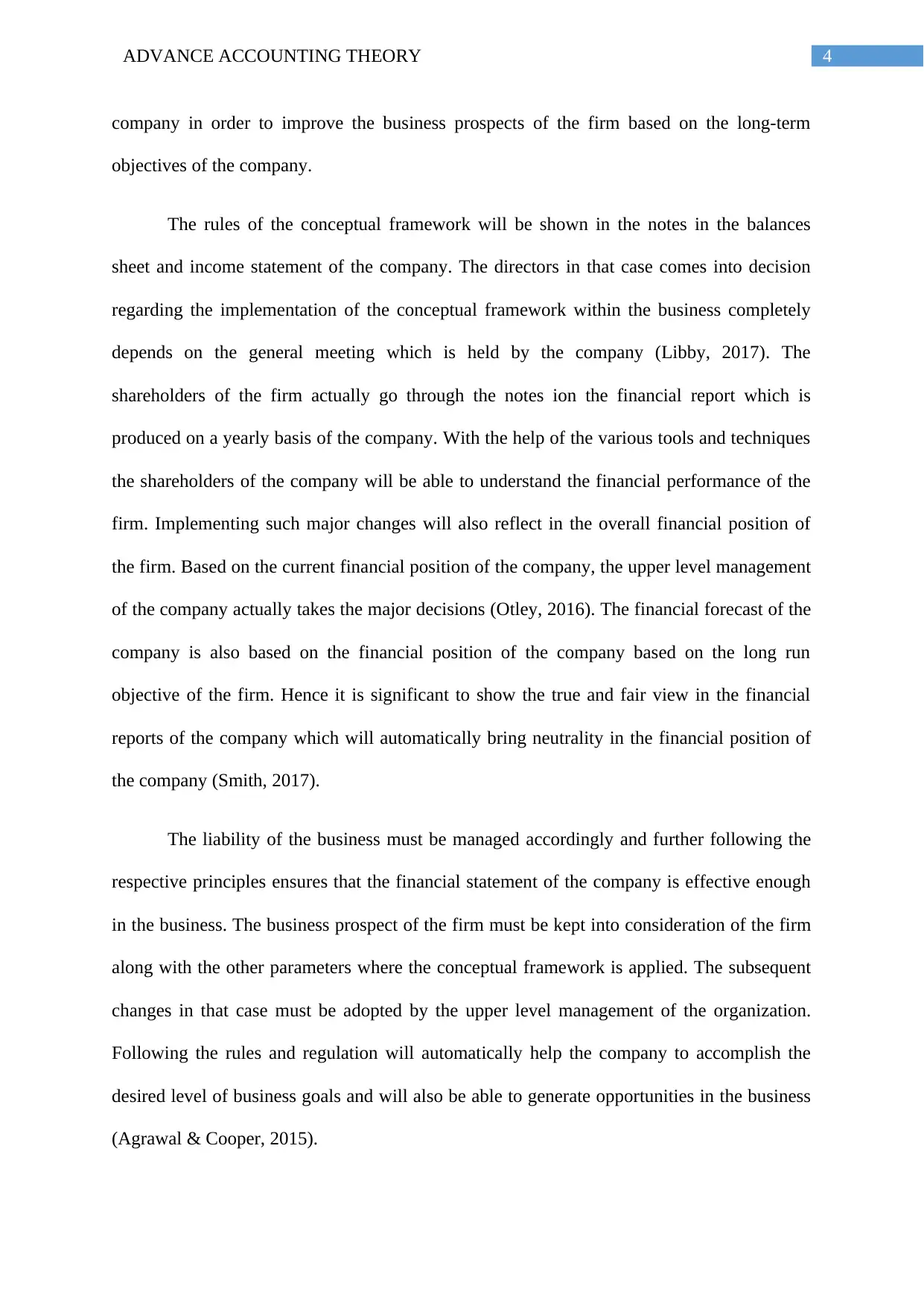
4ADVANCE ACCOUNTING THEORY
company in order to improve the business prospects of the firm based on the long-term
objectives of the company.
The rules of the conceptual framework will be shown in the notes in the balances
sheet and income statement of the company. The directors in that case comes into decision
regarding the implementation of the conceptual framework within the business completely
depends on the general meeting which is held by the company (Libby, 2017). The
shareholders of the firm actually go through the notes ion the financial report which is
produced on a yearly basis of the company. With the help of the various tools and techniques
the shareholders of the company will be able to understand the financial performance of the
firm. Implementing such major changes will also reflect in the overall financial position of
the firm. Based on the current financial position of the company, the upper level management
of the company actually takes the major decisions (Otley, 2016). The financial forecast of the
company is also based on the financial position of the company based on the long run
objective of the firm. Hence it is significant to show the true and fair view in the financial
reports of the company which will automatically bring neutrality in the financial position of
the company (Smith, 2017).
The liability of the business must be managed accordingly and further following the
respective principles ensures that the financial statement of the company is effective enough
in the business. The business prospect of the firm must be kept into consideration of the firm
along with the other parameters where the conceptual framework is applied. The subsequent
changes in that case must be adopted by the upper level management of the organization.
Following the rules and regulation will automatically help the company to accomplish the
desired level of business goals and will also be able to generate opportunities in the business
(Agrawal & Cooper, 2015).
company in order to improve the business prospects of the firm based on the long-term
objectives of the company.
The rules of the conceptual framework will be shown in the notes in the balances
sheet and income statement of the company. The directors in that case comes into decision
regarding the implementation of the conceptual framework within the business completely
depends on the general meeting which is held by the company (Libby, 2017). The
shareholders of the firm actually go through the notes ion the financial report which is
produced on a yearly basis of the company. With the help of the various tools and techniques
the shareholders of the company will be able to understand the financial performance of the
firm. Implementing such major changes will also reflect in the overall financial position of
the firm. Based on the current financial position of the company, the upper level management
of the company actually takes the major decisions (Otley, 2016). The financial forecast of the
company is also based on the financial position of the company based on the long run
objective of the firm. Hence it is significant to show the true and fair view in the financial
reports of the company which will automatically bring neutrality in the financial position of
the company (Smith, 2017).
The liability of the business must be managed accordingly and further following the
respective principles ensures that the financial statement of the company is effective enough
in the business. The business prospect of the firm must be kept into consideration of the firm
along with the other parameters where the conceptual framework is applied. The subsequent
changes in that case must be adopted by the upper level management of the organization.
Following the rules and regulation will automatically help the company to accomplish the
desired level of business goals and will also be able to generate opportunities in the business
(Agrawal & Cooper, 2015).
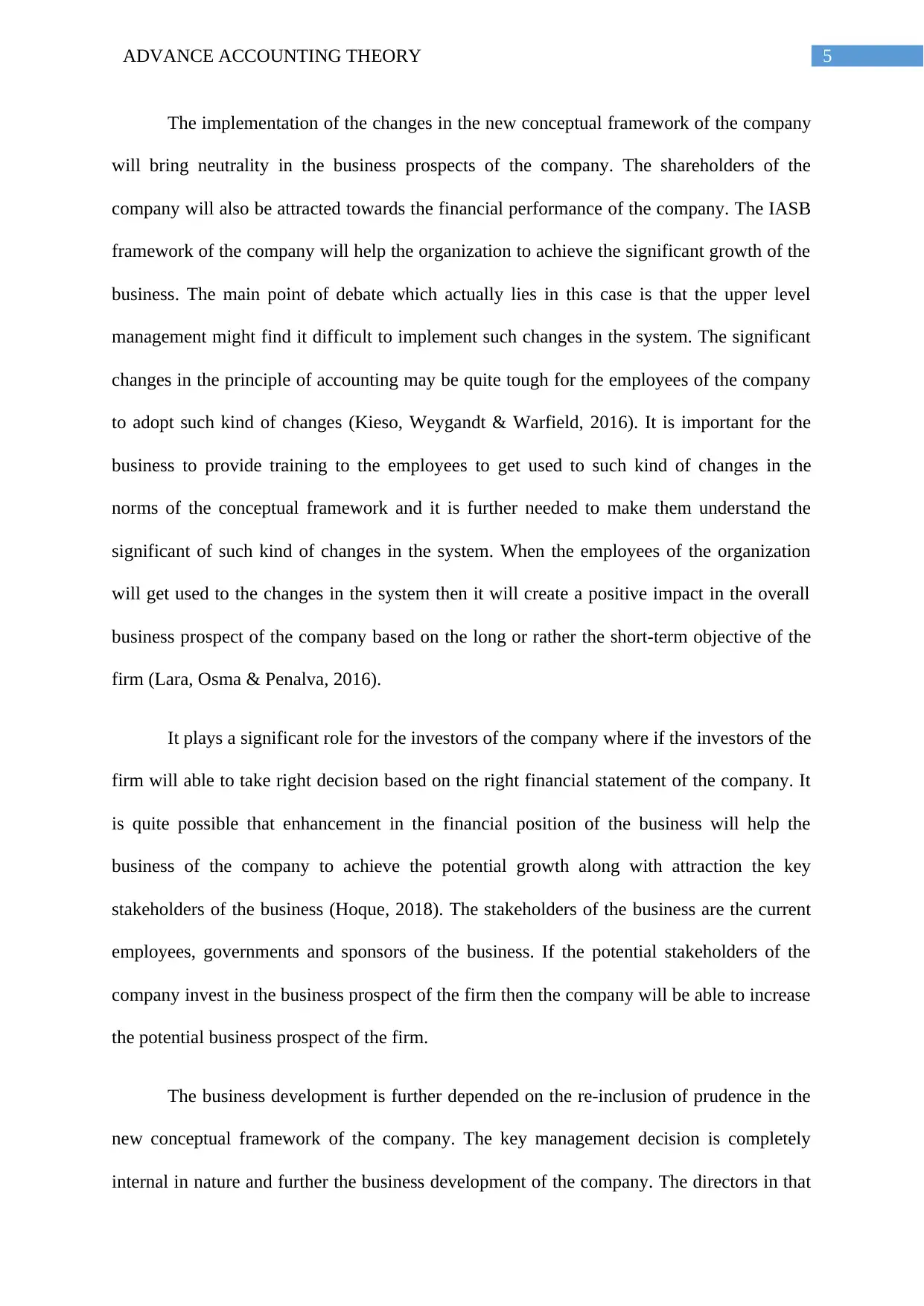
5ADVANCE ACCOUNTING THEORY
The implementation of the changes in the new conceptual framework of the company
will bring neutrality in the business prospects of the company. The shareholders of the
company will also be attracted towards the financial performance of the company. The IASB
framework of the company will help the organization to achieve the significant growth of the
business. The main point of debate which actually lies in this case is that the upper level
management might find it difficult to implement such changes in the system. The significant
changes in the principle of accounting may be quite tough for the employees of the company
to adopt such kind of changes (Kieso, Weygandt & Warfield, 2016). It is important for the
business to provide training to the employees to get used to such kind of changes in the
norms of the conceptual framework and it is further needed to make them understand the
significant of such kind of changes in the system. When the employees of the organization
will get used to the changes in the system then it will create a positive impact in the overall
business prospect of the company based on the long or rather the short-term objective of the
firm (Lara, Osma & Penalva, 2016).
It plays a significant role for the investors of the company where if the investors of the
firm will able to take right decision based on the right financial statement of the company. It
is quite possible that enhancement in the financial position of the business will help the
business of the company to achieve the potential growth along with attraction the key
stakeholders of the business (Hoque, 2018). The stakeholders of the business are the current
employees, governments and sponsors of the business. If the potential stakeholders of the
company invest in the business prospect of the firm then the company will be able to increase
the potential business prospect of the firm.
The business development is further depended on the re-inclusion of prudence in the
new conceptual framework of the company. The key management decision is completely
internal in nature and further the business development of the company. The directors in that
The implementation of the changes in the new conceptual framework of the company
will bring neutrality in the business prospects of the company. The shareholders of the
company will also be attracted towards the financial performance of the company. The IASB
framework of the company will help the organization to achieve the significant growth of the
business. The main point of debate which actually lies in this case is that the upper level
management might find it difficult to implement such changes in the system. The significant
changes in the principle of accounting may be quite tough for the employees of the company
to adopt such kind of changes (Kieso, Weygandt & Warfield, 2016). It is important for the
business to provide training to the employees to get used to such kind of changes in the
norms of the conceptual framework and it is further needed to make them understand the
significant of such kind of changes in the system. When the employees of the organization
will get used to the changes in the system then it will create a positive impact in the overall
business prospect of the company based on the long or rather the short-term objective of the
firm (Lara, Osma & Penalva, 2016).
It plays a significant role for the investors of the company where if the investors of the
firm will able to take right decision based on the right financial statement of the company. It
is quite possible that enhancement in the financial position of the business will help the
business of the company to achieve the potential growth along with attraction the key
stakeholders of the business (Hoque, 2018). The stakeholders of the business are the current
employees, governments and sponsors of the business. If the potential stakeholders of the
company invest in the business prospect of the firm then the company will be able to increase
the potential business prospect of the firm.
The business development is further depended on the re-inclusion of prudence in the
new conceptual framework of the company. The key management decision is completely
internal in nature and further the business development of the company. The directors in that
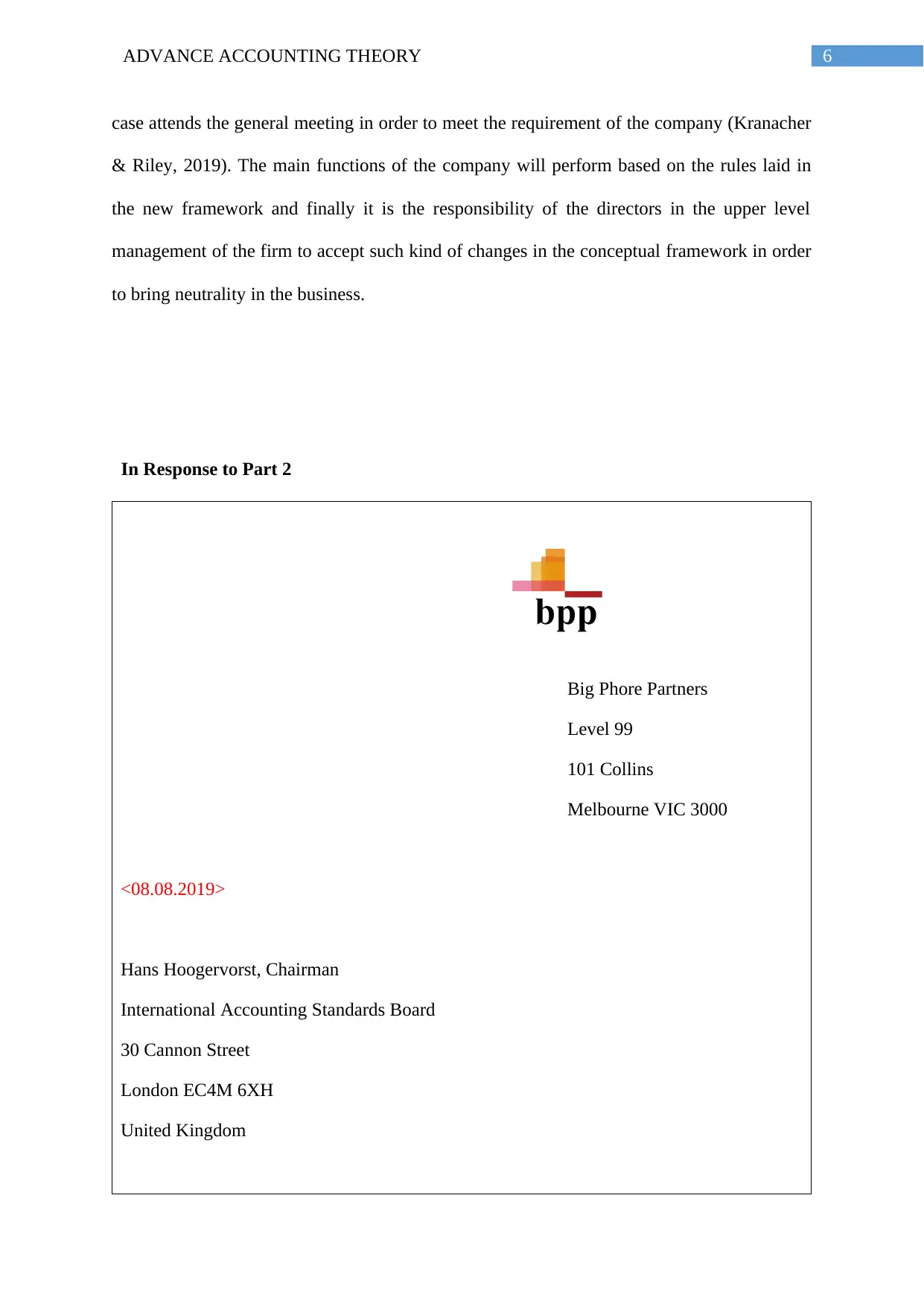
6ADVANCE ACCOUNTING THEORY
case attends the general meeting in order to meet the requirement of the company (Kranacher
& Riley, 2019). The main functions of the company will perform based on the rules laid in
the new framework and finally it is the responsibility of the directors in the upper level
management of the firm to accept such kind of changes in the conceptual framework in order
to bring neutrality in the business.
In Response to Part 2
Big Phore Partners
Level 99
101 Collins
Melbourne VIC 3000
<08.08.2019>
Hans Hoogervorst, Chairman
International Accounting Standards Board
30 Cannon Street
London EC4M 6XH
United Kingdom
case attends the general meeting in order to meet the requirement of the company (Kranacher
& Riley, 2019). The main functions of the company will perform based on the rules laid in
the new framework and finally it is the responsibility of the directors in the upper level
management of the firm to accept such kind of changes in the conceptual framework in order
to bring neutrality in the business.
In Response to Part 2
Big Phore Partners
Level 99
101 Collins
Melbourne VIC 3000
<08.08.2019>
Hans Hoogervorst, Chairman
International Accounting Standards Board
30 Cannon Street
London EC4M 6XH
United Kingdom
Paraphrase This Document
Need a fresh take? Get an instant paraphrase of this document with our AI Paraphraser
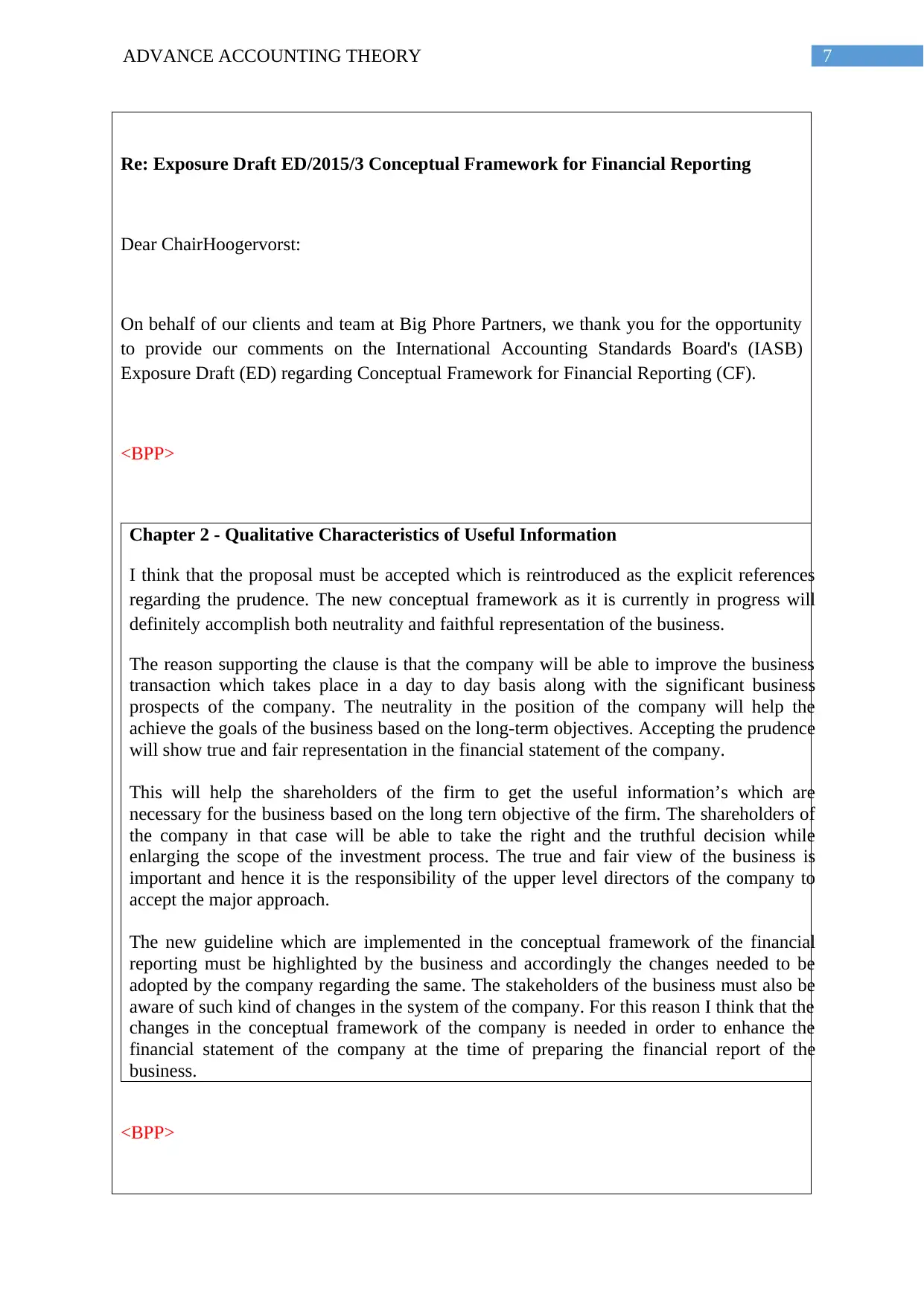
7ADVANCE ACCOUNTING THEORY
Re: Exposure Draft ED/2015/3 Conceptual Framework for Financial Reporting
Dear ChairHoogervorst:
On behalf of our clients and team at Big Phore Partners, we thank you for the opportunity
to provide our comments on the International Accounting Standards Board's (IASB)
Exposure Draft (ED) regarding Conceptual Framework for Financial Reporting (CF).
<BPP>
Chapter 2 - Qualitative Characteristics of Useful Information
I think that the proposal must be accepted which is reintroduced as the explicit references
regarding the prudence. The new conceptual framework as it is currently in progress will
definitely accomplish both neutrality and faithful representation of the business.
The reason supporting the clause is that the company will be able to improve the business
transaction which takes place in a day to day basis along with the significant business
prospects of the company. The neutrality in the position of the company will help the
achieve the goals of the business based on the long-term objectives. Accepting the prudence
will show true and fair representation in the financial statement of the company.
This will help the shareholders of the firm to get the useful information’s which are
necessary for the business based on the long tern objective of the firm. The shareholders of
the company in that case will be able to take the right and the truthful decision while
enlarging the scope of the investment process. The true and fair view of the business is
important and hence it is the responsibility of the upper level directors of the company to
accept the major approach.
The new guideline which are implemented in the conceptual framework of the financial
reporting must be highlighted by the business and accordingly the changes needed to be
adopted by the company regarding the same. The stakeholders of the business must also be
aware of such kind of changes in the system of the company. For this reason I think that the
changes in the conceptual framework of the company is needed in order to enhance the
financial statement of the company at the time of preparing the financial report of the
business.
<BPP>
Re: Exposure Draft ED/2015/3 Conceptual Framework for Financial Reporting
Dear ChairHoogervorst:
On behalf of our clients and team at Big Phore Partners, we thank you for the opportunity
to provide our comments on the International Accounting Standards Board's (IASB)
Exposure Draft (ED) regarding Conceptual Framework for Financial Reporting (CF).
<BPP>
Chapter 2 - Qualitative Characteristics of Useful Information
I think that the proposal must be accepted which is reintroduced as the explicit references
regarding the prudence. The new conceptual framework as it is currently in progress will
definitely accomplish both neutrality and faithful representation of the business.
The reason supporting the clause is that the company will be able to improve the business
transaction which takes place in a day to day basis along with the significant business
prospects of the company. The neutrality in the position of the company will help the
achieve the goals of the business based on the long-term objectives. Accepting the prudence
will show true and fair representation in the financial statement of the company.
This will help the shareholders of the firm to get the useful information’s which are
necessary for the business based on the long tern objective of the firm. The shareholders of
the company in that case will be able to take the right and the truthful decision while
enlarging the scope of the investment process. The true and fair view of the business is
important and hence it is the responsibility of the upper level directors of the company to
accept the major approach.
The new guideline which are implemented in the conceptual framework of the financial
reporting must be highlighted by the business and accordingly the changes needed to be
adopted by the company regarding the same. The stakeholders of the business must also be
aware of such kind of changes in the system of the company. For this reason I think that the
changes in the conceptual framework of the company is needed in order to enhance the
financial statement of the company at the time of preparing the financial report of the
business.
<BPP>
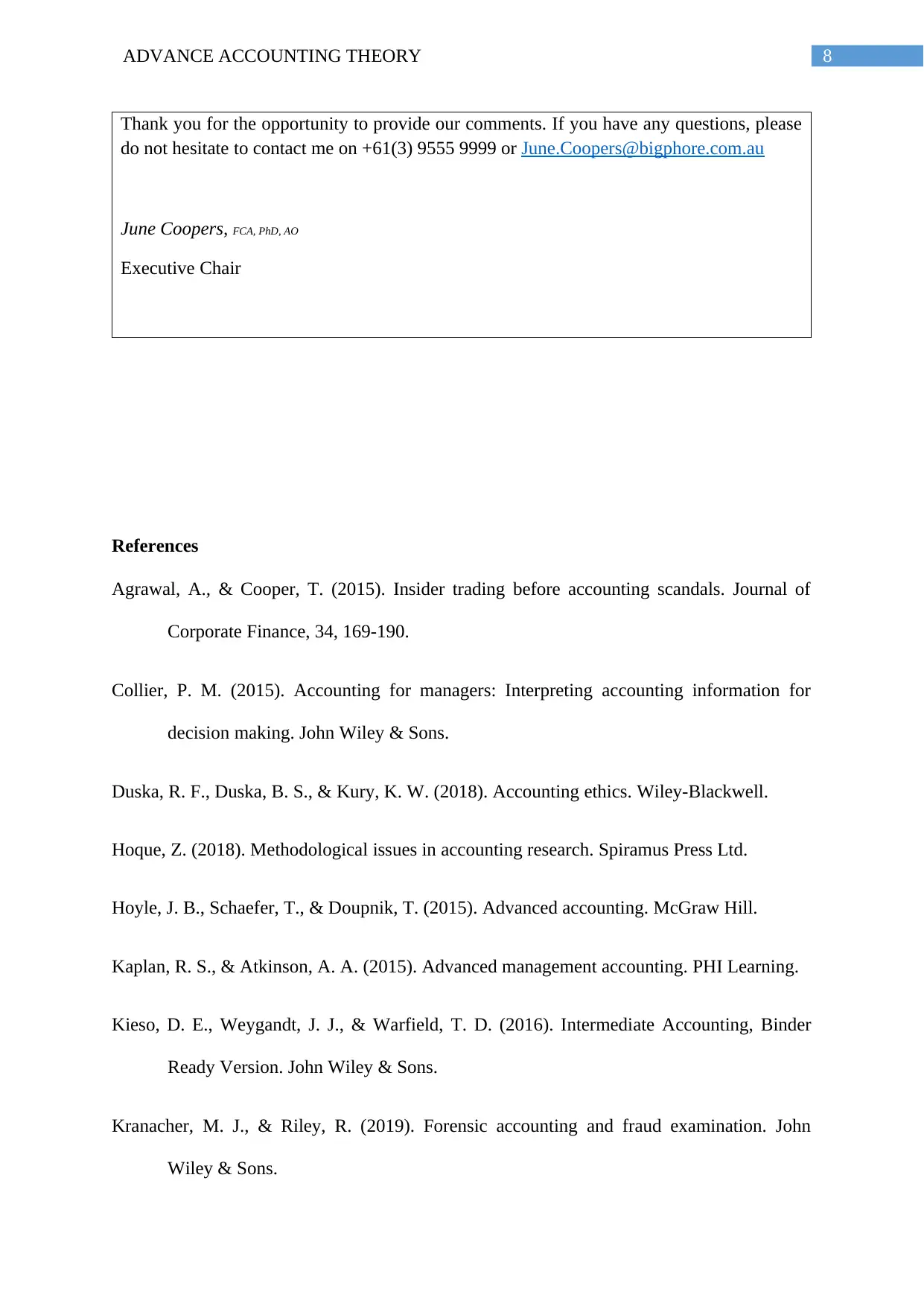
8ADVANCE ACCOUNTING THEORY
Thank you for the opportunity to provide our comments. If you have any questions, please
do not hesitate to contact me on +61(3) 9555 9999 or June.Coopers@bigphore.com.au
June Coopers, FCA, PhD, AO
Executive Chair
References
Agrawal, A., & Cooper, T. (2015). Insider trading before accounting scandals. Journal of
Corporate Finance, 34, 169-190.
Collier, P. M. (2015). Accounting for managers: Interpreting accounting information for
decision making. John Wiley & Sons.
Duska, R. F., Duska, B. S., & Kury, K. W. (2018). Accounting ethics. Wiley-Blackwell.
Hoque, Z. (2018). Methodological issues in accounting research. Spiramus Press Ltd.
Hoyle, J. B., Schaefer, T., & Doupnik, T. (2015). Advanced accounting. McGraw Hill.
Kaplan, R. S., & Atkinson, A. A. (2015). Advanced management accounting. PHI Learning.
Kieso, D. E., Weygandt, J. J., & Warfield, T. D. (2016). Intermediate Accounting, Binder
Ready Version. John Wiley & Sons.
Kranacher, M. J., & Riley, R. (2019). Forensic accounting and fraud examination. John
Wiley & Sons.
Thank you for the opportunity to provide our comments. If you have any questions, please
do not hesitate to contact me on +61(3) 9555 9999 or June.Coopers@bigphore.com.au
June Coopers, FCA, PhD, AO
Executive Chair
References
Agrawal, A., & Cooper, T. (2015). Insider trading before accounting scandals. Journal of
Corporate Finance, 34, 169-190.
Collier, P. M. (2015). Accounting for managers: Interpreting accounting information for
decision making. John Wiley & Sons.
Duska, R. F., Duska, B. S., & Kury, K. W. (2018). Accounting ethics. Wiley-Blackwell.
Hoque, Z. (2018). Methodological issues in accounting research. Spiramus Press Ltd.
Hoyle, J. B., Schaefer, T., & Doupnik, T. (2015). Advanced accounting. McGraw Hill.
Kaplan, R. S., & Atkinson, A. A. (2015). Advanced management accounting. PHI Learning.
Kieso, D. E., Weygandt, J. J., & Warfield, T. D. (2016). Intermediate Accounting, Binder
Ready Version. John Wiley & Sons.
Kranacher, M. J., & Riley, R. (2019). Forensic accounting and fraud examination. John
Wiley & Sons.
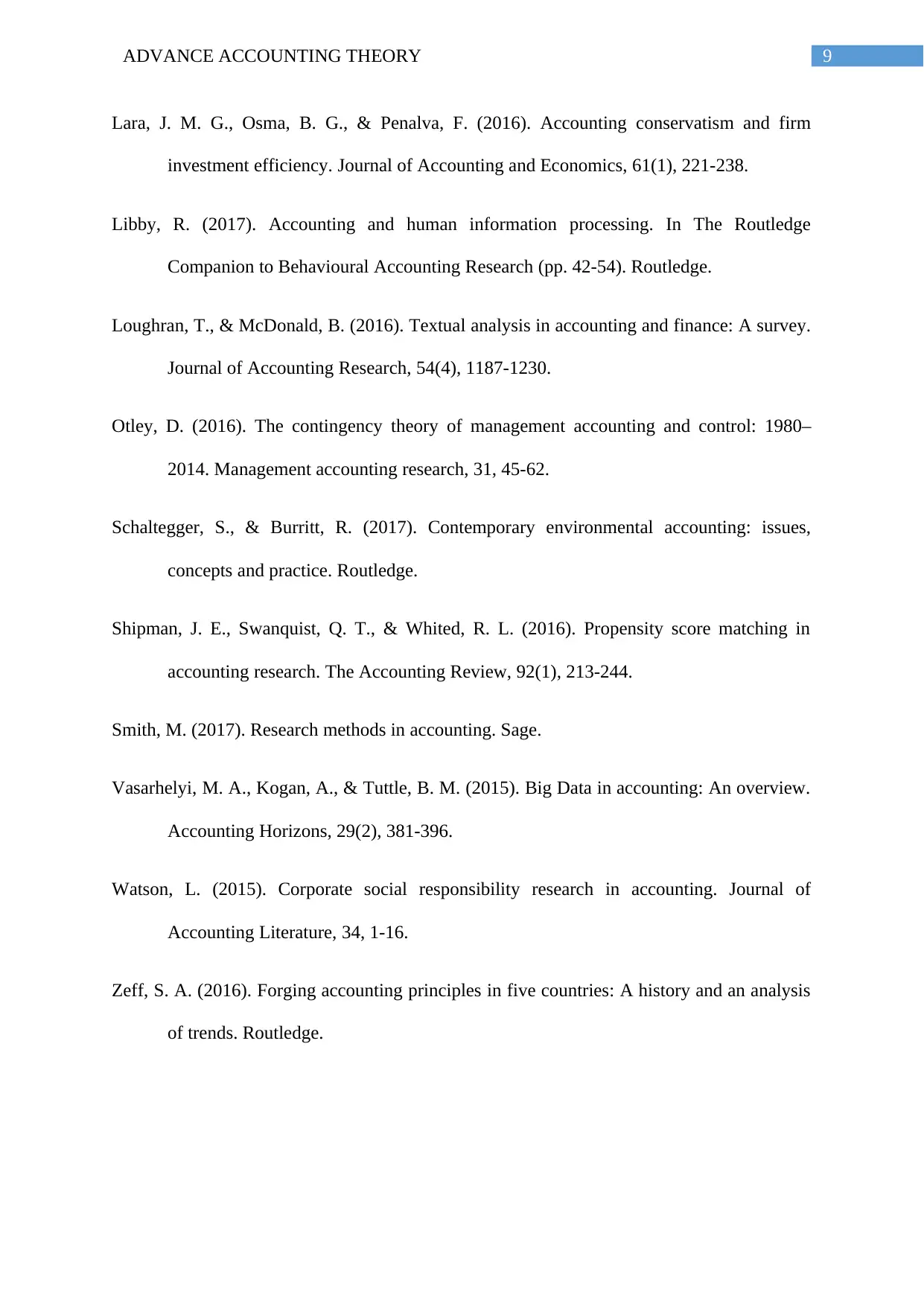
9ADVANCE ACCOUNTING THEORY
Lara, J. M. G., Osma, B. G., & Penalva, F. (2016). Accounting conservatism and firm
investment efficiency. Journal of Accounting and Economics, 61(1), 221-238.
Libby, R. (2017). Accounting and human information processing. In The Routledge
Companion to Behavioural Accounting Research (pp. 42-54). Routledge.
Loughran, T., & McDonald, B. (2016). Textual analysis in accounting and finance: A survey.
Journal of Accounting Research, 54(4), 1187-1230.
Otley, D. (2016). The contingency theory of management accounting and control: 1980–
2014. Management accounting research, 31, 45-62.
Schaltegger, S., & Burritt, R. (2017). Contemporary environmental accounting: issues,
concepts and practice. Routledge.
Shipman, J. E., Swanquist, Q. T., & Whited, R. L. (2016). Propensity score matching in
accounting research. The Accounting Review, 92(1), 213-244.
Smith, M. (2017). Research methods in accounting. Sage.
Vasarhelyi, M. A., Kogan, A., & Tuttle, B. M. (2015). Big Data in accounting: An overview.
Accounting Horizons, 29(2), 381-396.
Watson, L. (2015). Corporate social responsibility research in accounting. Journal of
Accounting Literature, 34, 1-16.
Zeff, S. A. (2016). Forging accounting principles in five countries: A history and an analysis
of trends. Routledge.
Lara, J. M. G., Osma, B. G., & Penalva, F. (2016). Accounting conservatism and firm
investment efficiency. Journal of Accounting and Economics, 61(1), 221-238.
Libby, R. (2017). Accounting and human information processing. In The Routledge
Companion to Behavioural Accounting Research (pp. 42-54). Routledge.
Loughran, T., & McDonald, B. (2016). Textual analysis in accounting and finance: A survey.
Journal of Accounting Research, 54(4), 1187-1230.
Otley, D. (2016). The contingency theory of management accounting and control: 1980–
2014. Management accounting research, 31, 45-62.
Schaltegger, S., & Burritt, R. (2017). Contemporary environmental accounting: issues,
concepts and practice. Routledge.
Shipman, J. E., Swanquist, Q. T., & Whited, R. L. (2016). Propensity score matching in
accounting research. The Accounting Review, 92(1), 213-244.
Smith, M. (2017). Research methods in accounting. Sage.
Vasarhelyi, M. A., Kogan, A., & Tuttle, B. M. (2015). Big Data in accounting: An overview.
Accounting Horizons, 29(2), 381-396.
Watson, L. (2015). Corporate social responsibility research in accounting. Journal of
Accounting Literature, 34, 1-16.
Zeff, S. A. (2016). Forging accounting principles in five countries: A history and an analysis
of trends. Routledge.
1 out of 10
Related Documents
Your All-in-One AI-Powered Toolkit for Academic Success.
+13062052269
info@desklib.com
Available 24*7 on WhatsApp / Email
![[object Object]](/_next/static/media/star-bottom.7253800d.svg)
Unlock your academic potential
© 2024 | Zucol Services PVT LTD | All rights reserved.





